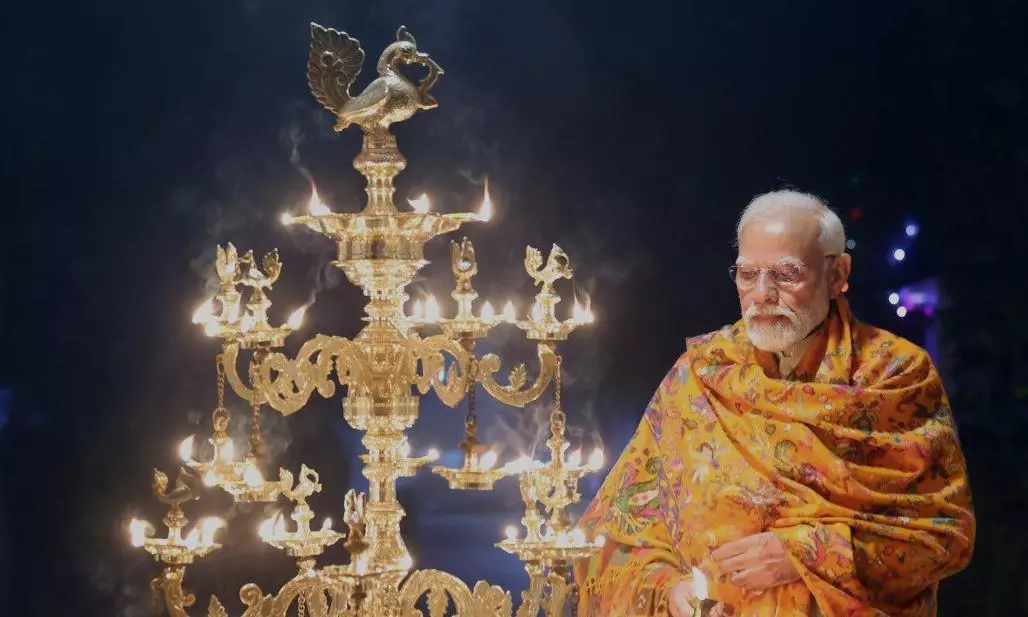
2 of 3 promises done, BJP approaches 2024 polls with renewed vigour
Abrogation of Article 370 and construction of Ram Temple boost party's electoral prospects; third promise, of implementing UCC, may not sit well with NDA allies

“This is a temple of national consciousness in the form of Ram. Ram is the faith of India, Ram is the foundation of India. Ram is the idea of India, Ram is the law of India...Ram is the prestige of India, Ram is the glory of India. Ram is the leader and Ram is the policy. Ram is eternal. When Ram is honoured, its effect does not last for years or centuries, its effect is for thousands of years.”
These are excerpts from Prime Minister Narendra Modi’s address after the consecration of the Ram temple in Ayodhya on Monday, a major event that may well help the BJP take the first step towards retaining power in the 2024 Lok Sabha elections scheduled to take place in April-May this year.
Two of three promises
In his second term, Modi has managed to fulfill two of the three key promises that the BJP made in its election manifestos over the past three decades – abrogation of Article 370 and the construction of a Ram temple in Ayodhya.
The impact of the Ram Temple’s consecration ceremony can be understood from the fact that senior leaders of the BJP asked all of the party's 384 parliamentarians – 290 in the Lok Sabha and 94 in the Rajya Sabha – along with more than 1,300 MLAs and over 290 MLCs, to spend time in their constituencies, organise a live telecast of the ceremony, distribute free meals and sweets, and also celebrate the historic occasion.
“This is Prime Minister Narendra Modi’s tryst with destiny, but in a different way. Though the BJP promised the construction of the Ram temple in Ayodhya in June 1989, it should not be seen only as an electoral promise. It is not just the consecration of Lord Rama’s idol but also the consecration of faith, confidence, and cultural nationalism. It is a historic moment and time to rejoice,” said Vinay Sahasrabuddhe, senior BJP leader and national executive member.
Strengthening ties
The consecration ceremony on Monday played a crucial role in bringing together key members of the National Democratic Alliance (NDA) in Ayodhya. The event also witnessed the participation of the political parties that had left the NDA a few years ago.
Among the current NDA allies who were present in Ayodhya were Pawan Kalyan of Jana Sena, and former Prime Minister HD Deve Gowda and his son HD Kumaraswamy from the JDS. The presence of TDP chief N Chandrababu Naidu was interesting because a large section of BJP leaders believe that the party must induct Naidu into the NDA before the Lok Sabha polls. However, the central leadership has not been able to choose between Naidu and his archrival, YS Jagan Mohan Reddy, the incumbent Chief Minister of Andhra Pradesh.
“It is a day to rejoice for the Hindus all over the world. I would like to congratulate all the Indians,” said Shiromani Akali Dal (SAD) chief Sukhbir Singh Badal.
While it has been speculated for a long time that SAD could return to the NDA, it didn’t materialise as the BJP started talking about the implementation of the Uniform Civil Code (UCC) in the country. Senior SAD leadership is keen on forging a tie-up with the BJP. However, the issues like UCC and farm protests are the stumbling blocks.
Poll prospects
Political analysts believe that the construction of the Ram temple may boost the electoral prospects of the BJP and there is every possibility that the BJP may improve its tally in the coming Lok Sabha elections.
“The BJP will certainly benefit from the Ram temple construction and the party may cross its 2019 tally of 303. I believe the BJP will improve its numbers in the states like Uttar Pradesh and Bihar. In other states of North India, BJP has reached its saturation point. The BJP can make some impact in the southern states as well,” said Sanjay Kumar, professor and Co-Director of Lokniti, Centre for the Study of Developing Societies (CSDS).
Uniform Civil Code
The only challenge before the BJP now is fulfilling its third major promise of implementing UCC in the country. While the Law Commission has resumed discussion over the possible implementation of UCC nationally, the issue needs further political consideration because it can create trouble within the NDA.
The issue of UCC left the NDA divided last year, and it was only after PM Modi stepped in and spoke to the alliance partners, especially those in the northeast, that the differences subsided. For now, the central leadership of the BJP has promised that it will not implement UCC in the current term and that it will only happen after thorough consultation with all the NDA partners.


